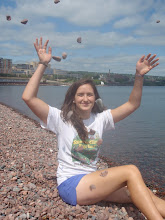Saturday, April 25, 2009
For Cedric 2.
Monday, April 13, 2009
For Cedric.
Cedric.
I see you haven’t changed one single bit. You are the same snot-nosed little boy who would pop gum in Ms. Liebgott’s face and make fun of her name just because it had the word “love” in it. Remember the time you pulled your shorts down in front of her car and wagged your pink little butt at the one-way glass, just because she hadn’t been able to name the Pokemon you’d drawn in class? (It was Mewtwo, I remember, because you borrowed my favorite purple colored pencil to draw it and broke the tip so bad I had to sharpen it until my arm practically fell off, so I could get the point just right again, and when you gave me that drawing my jaw fell so fast it hurt, especially since your ears were red and you looked like you actually felt sorry so I kept your drawing until my mother accidentally put it through the wash with my red Christmas socks and it turned into pink pulpy mush and had to be thrown out with the leftover chicken bones and potato peels.) People notice more than you think, Cedric.
Cedric, did you know that when you fell into that crevice in that godforsaken place your father took you to and were in the hospital for all that time we were back at school and everyone heard all about it. Well, anyway we were trying to find out as much as we could, but first step was, figuring out what the heck coma even was. Jill thought that meant you’d died and she burst into tears right smack-dab in the middle of the hallway. I was embarrassed for her, for god’s sake. I had to drag her into the classroom and sit her down and make her wipe her face off while I got the Webster’s Dictionary Unabridged Version and read off the definition of a coma, just to make her shut up. It read,
Coma\Co"ma [Latin, hair, from Greek ko`mh.] n. 1. A state of deep and often prolonged unconsciousness; usually the result of disease or injury. 2. A usually terminal tuft of hairs especially on a seed. 3. The luminous cloud of particles surrounding the frozen nucleus of a comet; forms as the comet approaches the sun and is warmed.
We figured you were the first one, since you are not a seed, and even Jill knows what a comet is and you are not a comet. It sounded serious though, and we wondered how what kind of ice it could have been to make you so sick. We started tiptoeing at recess, avoiding the real icy patches and taking turns using Lacie’s electric hair dryer to melt it off around the doorways (because the cord only reached that far) so nobody would slip on the ice and get coma. Teachers were talking about you, Cedric. Talking with their worried faces, the ones they reserve for talking about the stock market and extreme tornado warnings – not the angry faces they always used when they talked about you before you got coma. That made me scared, too. Even though all you ever did was give me that dumb picture of Mewtwo and break my favorite purple pencil. People notice more than you think, you know.
If all I ever did was eat paste, Cedric, then all you ever did was talk about it.
Nikki.
